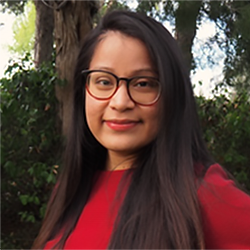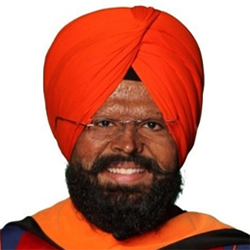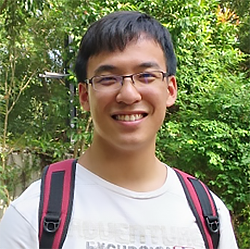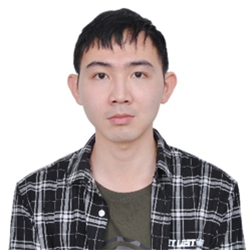
Frontera Computational Science Fellowships
2021-2022 Fellowship Awardees

Welcome to TACC’s Frontera Computational Science Fellowship awardees for 2021-2022. The program provides a year-long opportunity for talented graduate students to compute on the most powerful academic supercomputer in the world and collaborate with experts at TACC.

Liliana Cabrera Gallegos
School: Colorado State University
Field of Research: PhD candidate, Computational Organic Chemistry
Why did you become a scientist?
My college organic chemistry professor introduced a roadmap for understanding molecular reactivity by asking, "Where are the electrons?" Through that simple question, I found a passion for synthetic organic chemistry. Now, as a chemist, I can be both an explorer of the unknown and an entertainer with chemical elixirs.
What is your favorite aspect of your research?
I’m fascinated with exploring the realm of data-driven and computational chemistry to study challenging organic and organometallic reaction mechanisms. My favorite part of my research is working alongside experimental collaborators to propose a plausible mechanism and validate the predictions.
What excites you most about working on the Frontera supercomputer?
Investigating the reactivity performance of catalytic reactions through machine learning methods will be driven by an extensive, high-throughput quantum chemical data set. I'm thrilled to access the node-hours on the powerful Frontera supercomputer to pipeline my research.
What do you hope to accomplish during your time as a Frontera fellow?
Working as an experimental organic chemist, I face the long and laborious challenge of optimizing reaction conditions steered by serendipity. I hope my research as a Frontera fellow improves the organic reaction optimization process in catalytic reactions with guidance from researchers, academic, and industry professionals through this fellowship. This research will also assist in the open release of my developed pipeline code to the public.
What do you like to do when you aren't working on research?
It's always fun going on adventures with my two favorite earthlings—my husband and our supersized dog. I enjoy exploring the outdoors by going on long hikes and road trips in our camper van.

Gurpreet Singh Hora
School: Columbia University
Field of Research: PhD candidate, Civil Engineering and Engineering Mechanics
Why did you become a scientist?
During my schooling, I developed a strong aptitude for mathematics and sciences and have always enjoyed solving challenging problems in these areas. This inclination encouraged me to pursue a degree in engineering. I was lucky enough to get exposure to the wonderful fields of computational science and machine learning, which along with my passion for interdisciplinary research, motivated me to pursue doctoral studies and become a computational scientist.
What is your favorite aspect of your research?
My research is centered on environmental fluid dynamics and data science. My focus is to advance the current understanding of turbulent transport in engineering and environmental systems using machine learning algorithms. The inherently interdisciplinary nature of my research is my favorite part because it provides me a chance to interact with researchers from different disciplines and to contribute to problems with important implications from both fundamental and applied perspectives.
What excites you most about working on the Frontera supercomputer?
I’m extremely excited to work alongside well-known experts in high-performance computing (HPC). In addition, I’m excited about being able to fine-tune my algorithms to make the most out of one of the finest HPC platforms in the world.
What do you hope to accomplish during your time as a Frontera fellow?
I look forward to collaborating with researchers and running state-of-the-art turbulent transport and machine learning simulations. These will be directed towards advancing the current understanding and modeling capabilities of turbulent transport of pollutants in the atmosphere, and hopefully, lead to the publication of a journal article. I’m also looking forward to networking events with academicians and industry professionals, and to get their input on my ongoing research and career goals.
What do you like to do when you aren't working on research?
I enjoy walking next to the Hudson River or in Central Park near the Columbia campus. Whilst I am not fitness-obsessed, training helps me relieve stress and maintain a positive mindset. In addition to this, I spend time improving my cooking skills (mainly Indian curries). Last but not least, I embrace opportunities such as attending seminars/webinars, taking classes, and reading books and journals for professional improvement.

Yui Tik ‘Andrew’ Pang
School: Georgia Institute of Technology
Field of Research: PhD Candidate, Biophysics
Why did you become a scientist?
I have always been fascinated by nature. I wonder about the mechanisms behind every phenomenon, and science provides me with a path to the answers. My first research opportunity came during my third year as a physics undergraduate, and I absolutely loved the experience. Since then, I decided to pursue a career as a scientist and went to graduate school.
What is your favorite aspect of your research?
I work in the field of biophysics, but I’m amazed by how physics and mathematical models are used to explain biological phenomena. My research focuses on the simulation of protein dynamics, in which the simulation engine computes the motion of every atom in the system according to thermodynamics and chemistry. A single atomistic interaction can induce a large-scale conformational change, altering a protein’s function.
What excites you most about working on the Frontera supercomputer?
I’m excited by Frontera’s petascale computing power, and its ability to support the growth of the open science community allocations to scientists.
What do you hope to accomplish during your time as a Frontera fellow?
Despite the tremendous growth in computational power, atomistic molecular dynamics simulations of slow biological processes, like protein folding, are still prohibitively expensive. I aim to extend and improve upon the deep-learning method RAVE to identify the most effective reaction coordinates for subsequent enhanced sampling. I will apply RAVE to the folding of a large domain in the bacterial protein pertactin, which is relevant to infectious disease.
What do you like to do when you aren't working on research?
I like visiting new places, trying new food, and meeting new people. In addition, I enjoy working on programming projects for fun. Recently, I wrote a small program on my Arduino board to display a waterfall animation on an LED matrix panel. I used that to decorate my PC and it looks pretty cool!

Hongyuan Zhang
School: University of Minnesota Twin Cities
Field of Research: Ph.D. Candidate, Mechanical Engineering
Why did you become a scientist?
I enjoy solving challenging problems in mathematics, physics, and programming. During my undergraduate years, I learned about computational fluid dynamics (CFD), which combines all the subjects I’m good at and interested in. The research in this field provided me with a sense of accomplishment, which made me decide to become a scientist.
What is your favorite aspect of your research?
CFD is applied to a wide range of problems, including environmental engineering, weather forecasting, and combustion system design. It's fulfilling knowing that my results can be used to improve the quality of the industrial design. There is still a lot of work to be done in this field. I enjoy the moment that my code works as I expected, greatly speeds up the simulation, and makes a complex simulation affordable.
What excites you most about working on the Frontera supercomputer?
Simulating combustion requires a lot of computing resources. Currently, I can only conduct relatively small-scale simulations with the limited resources I can access. Frontera is one of the most powerful supercomputers in the world, which will definitely help my research. Moreover, the system gives me access to the latest tools and trends in advanced computing. I can bring these new technologies into the field of CFD.
What do you hope to accomplish during your time as a Frontera fellow?
To keep up with changing technology trends, researchers need to learn and use new computing technologies. I plan to use this platform to learn the latest technologies and future development directions. I’ll apply the new features of MPI-3 to the in situ adaptive tabulation (ISAT) method to accelerate combustion simulations.
What do you like to do when you aren't working on research?
In my free time, I like to play video games and watch movies to relax. I also study math and the latest programming techniques. Recently, I started getting interested in literary theory and philosophy, which gives me a new perspective to understand the world.
2023-2024 Frontera Fellowship Awardees
2022-2023 Frontera Fellowship Awardees


